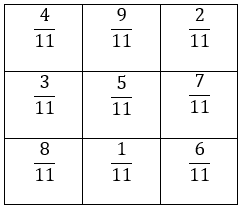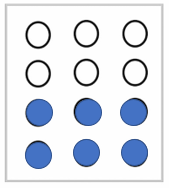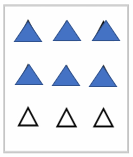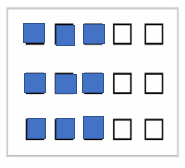Download NCERT Solutions for Class 7 Maths Chapter 2 – Fractions and Decimals – Exercise 2.1, Exercise 2.2, Exercise 2.3, Exercise 2.4, Exercise 2.5, Exercise 2.6, Exercise 2.7
NCERT Solutions for Class 7 Maths Chapter 2 Exercise 2.1
1. Solve
i) 2 –
=
=
=
ii) 4 +
=
=
=
=
iii) +
=
=
=
iv) –
=
=
=
v) +
=
= +
=
=
=
vi) +
= +
=
=
=
=
vii) –
= –
=
=
=
=
2. Arrange the following in descending order:
i) ,
,
Convert them into like fractions (LCM is 63)
Since 42 > 24 > 14
>
>
ii) ,
,
Convert them into like fractions (LCM is 70)
Since 49 > 30 > 14
>
>
3. In a “magic square”, the sum of the numbers in each row, in each column and along the diagonals is the same. Is this a magic square?
1st row:
2nd row:
3rd row:
1st column:
2nd column:
3rd column:
Diagonal 1:
Diagonal 2:
Therefore, the sum of all the numbers in each row, in each column and along the diagonals is
Hence, it is a magic square.
4. A rectangular sheet of paper is cm long and
cm wide. Find its perimeter.
Given: Length = =
cm
Breadth = =
cm
Perimeter of a rectangle is = 2(length + breadth)
= 2
= 2
= 2
= 2 x
=
=
Hence, Perimeter of rectangular sheet of paper is cm
5. Find the perimeters of (i) ∆ABE (ii) the rectangle BCDE in this figure. Whose perimeter is greater?
i. Perimeter of ∆ABE = AB + BE + EA
= +
+
= +
+
=
=
=
Perimeter of ∆ABE = cm
ii. Perimeter of rectangle = 2(length + breadth)
= 2[BE + ED]
=2
= 2
= 2
= 2
= 2x
=
= 7cm
Converting the perimeters of triangle and rectangle into like fractions (LCM is 60)
Since 531 > 430
Therefore, the Perimeter of ∆ABE> the perimeter of rectangle BCDE
6. Salil wants to put a picture in a frame. The picture is cm wide. To fit in the frame the picture cannot be more than
cm wide. How much should the picture be trimmed?
Given: Width of the picture = =
cm
Required width = =
cm
The picture should be trimmed by –
=
=
The picture should be trimmed by cm.
7. Ritu ate part of an apple and the remaining apple was eaten by her brother Somu.
How much part of the apple did Somu eat? Who had the larger share? By how much?
Given: Part of apple eaten by Ritu =
Part of apple eaten by Somu = 1 – =
Since 3 > 2, Ritu had the larger share of apple.
Difference between their share is –
=
Thus, Ritu’s share was larger than Somu’s share by
8. Michael finished colouring a picture in Vaibhav finished colouring the same picture in
hour. Who worked longer? By what fraction was it longer?
Given: Time taken by Michael = hour.
Time taken by Vaibhav = hour
=
Since 9 > 7, Vaibhav worked longer.
Difference in their time is –
=
hour
NCERT Solutions for Class 7 Maths Chapter 2 Exercise 2.2
1. Which of the drawings (a) to (d) show:
i) 2 x
Figure d) because it has 2 figures with each representing 1 out of 5 equal parts shaded.
ii) 2 x
Figure b) because it has 2 figures with each having 1 out of 2 equal parts shaded.
iii) 3 x
Figure a) because it has 3 figures with each having 2 out of 3 equal parts shaded.
iv) 3 x
Figure c) because it has 3 figures with each having 1 out of 4 equal parts shaded.
2. Some pictures (a) to (c) are given below. Tell which of them show:
i) 3 x =
Figure c) since 3 x represents the addition of 3 figures on the LHS with 1 out of 5 equal parts shaded and
represents 3 out of 5 equal parts shaded on the RHS.
ii) 2 x =
Figure a) since 2 x represents the addition of 2 figures on the LHS with 1 out of 3 equal parts shaded and
represents 2 out of 3 equal parts shaded on the RHS.
iii) 3 x =
Figure b) since 3 x represents the addition of 3 figures on the LHS with 3 out of 4 equal parts shaded and
= 2 +
represents 2 fully shaded figures and 1 out of 4 equal parts shaded on the RHS.
3. Multiply and reduce to lowest form and convert into a mixed fraction:
i) 7 x
=
=
ii)4 x
=
=
iii)2 x
=
=
iv)5 x
=
=
v) x 4
=
=
vi) x 6
=
= 15
vii)11 x
=
=
viii) 20 x
=
= 16
ix) 13 x
=
=
x) 15 x
=
= 9
4. Shade:
i) of the circles in box a)
Here, x 12 = 6 circles are shaded.
ii) of the triangles in box b)
Here, x 9 = 6 triangles are shaded.
iii) of the squares in box c)
Here, x 15 = 9 squares are shaded.
Find:
a) of
i) 24
x 24 = 12
ii) 46
x 46 = 23
b) of
i) 18
x 18 = 2 x 6 = 12
ii) 27
x 27 = 2 x 9 = 18
c) of
i) 16
x 16 = 3 x 4 = 12
ii) 36
x 36 = 3 x 9 = 27
d) of
i) 20
x 20 = 4 x 4 = 16
ii) 35
x 35 = 4 x 7 = 28
6. Multiply and express as a mixed fraction:
a) 3 x
= 3 x
=
=
b) 5 x
= 5 x
=
=
c) 7 x
= 7 x
=
=
d) 4 x
= 4 x
=
=
e) x 6
= x 6
=
=
=
f) x 8
= x 8
=
=
7. Find
a) of
i)
x
=
=
=
ii)
x
=
=
=
b) of
i)
x
=
=
=
ii)
x
=
=
=
8. Vidya and Pratap went for a picnic. Their mother gave them a water bottle that contained 5 litres of water. Vidhya consumed of the water. Pratap consumed the remaining water.
i) How much water did Vidya drink?
ii) What fraction of the total quantity of water did Pratap drink?
Given: Volume of water in the bottle = 5 litres
i. Water consumed by Vidhya = x 5 litres
Water consumed by Vidhya = 2 litres
ii. Fraction of water consumed by Pratap = 1 –
Fraction of water consumed by Pratap = of total water
NCERT Solutions for Class 7 Maths Chapter 2 Exercise 2.3
1. Find:
i) of
a)
x
=
b)
x
=
c)
x
=
ii) of
a)
x
=
b)
x
=
c)
x
=
2. Multiply and reduce to lowest form (if possible) :
i) x
= x
=
=
ii) x
=
iii) x
= x
=
iv) x
=
=
v) x
=
vi) x
=
=
vii) x
=
=
3. Multiply the following fractions:
i) x
= x
=
=
ii) x
= x
=
=
iii) x
= x
= 8
iv) x
= x
=
=
v) x
= x
=
=
vi) x 3
= x 3
=
=
vii) x
= x
=
=
4. Which is greater:
i) of
or
of
of
=
x
=
of
=
x
=
?
Convert them into like fractions (LCM is 56)
x
=
x
=
Since 21 > 12
>
Therefore, of
is greater.
ii) of
or
of
of
=
x
=
of
=
x
=
Since, 3 > 2
>
Therefore, of
is greater.
5. Saili plants 4 saplings, in a row, in her garden. The distance between two adjacent saplings is m . Find the distance between the first and the last sapling.
From the figure, the distance between the first and the last sapling is equal to 3 x =
=
m.
6. Lipika reads a book for hours every day. She reads the entire book in 6 days. How many hours in all were required by her to read the book?
Given: Number hours Lipika reads the book every day=
Number of days taken to read the book = 6
Total number of hours Lipika takes to read the entire book = x 6
= x 6
=
=
Time taken by Lipika to read the entire book is hours.
7. A car runs 16 km using 1 litre of petrol. How much distance will it cover using litres of petrol?
Given: Distance covered by car in 1 litre of petrol = 16km
Distance covered by car in litres of petrol = 16 x
= 16 x
= 44 km
Thus, the car will cover 44km using litres of petrol.
8. a) i) Provide the number in the box , such that
x
=
x
=
ii) The simplest form of the number obtained in is ___.
Ans: =
b) i) Provide the number in the box , such that
x
=
x
=
ii) The simplest form of the number obtained in is, _________.
cannot be further simplified.
NCERT Solutions for Class 7 Maths Chapter 2 Exercise 2.4
1. Find:
i) 12 ÷
= 12 x
= 16
ii) 14 ÷
= 14 x
=
iii) 8 ÷
= 8 x
=
iv) 4 ÷
= 4 x
=
v) 3 ÷
= 3 ÷
= 3 x
=
vi) 5 ÷
= 5 ÷
= 5 x
=
2. Find the reciprocal of each of the following fractions. Classify the reciprocals as proper fractions, improper fractions and whole numbers.
Note:
Proper Fractions: A fraction that is less than one, with the numerator less than the denominator.
Improper Fractions: A fraction in which the numerator is greater than its denominator
Whole Numbers: Collection of all positive integers, including 0
3. Find:
i) ÷ 2
= ÷
= x
=
ii) ÷ 5
= ÷
= x
=
iii) ÷ 7
= ÷
= x
=
iv) ÷ 3
= ÷
= x
=
v) ÷ 4
= ÷
= x
=
vi) ÷ 7
= ÷
= x
=
4. Find:
i) ÷
= x
=
ii) ÷
= x
=
iii) ÷
= x
=
iv) ÷
= ÷
= x
=
v) ÷
= ÷
= x
=
vi) ÷
= ÷
= x
=
vii) ÷
= ÷
= x
=
viii) ÷
= ÷
= x
=
NCERT Solutions for Class 7 Maths Chapter 2 Exercise 2.5
1. Which is greater?
i) 0.5 or 0.05
0.5 = =
=
0.05 =
50 > 5
Therefore, 0.5 > 0.05
ii) 0.7 or 0.5
0.7 =
0.5 =
7 > 5
Therefore, 0.7 > 0.5
iii) 7 or 0.7
7 = =
=
0.7 =
70 > 7
Therefore, 7 > 0.7
iv) 1.37 or 1.49
1.37 =
1.49 =
137 < 149
Therefore, 1.37 < 1.49
v) 2.03 or 2.30
2.03 =
2.30 =
203 < 230
Therefore, 2.03 < 2.30
vi) 0.8 or 0.88
0.8 = = =
=
0.88 =
80 < 88
Therefore, 0.8 < 0.88
2. Express as rupees using decimals:
Note: ₹ 1 = 100 paise. To convert paise into rupees, divide paise by 100
i) 7 paise
7 paise = ₹ = ₹0.07
ii) 7 rupees 7 paise
₹7 + ₹
= 7 + 0.07
= ₹ 7.07
iii) 77 rupees 77 paise
₹77 + ₹
= 77 + 0.77
= ₹ 77.77
iv) 50 paise
50 paise = ₹ = ₹0.5
v) 235 paise
235 paise = ₹ = ₹ 2.35
3) (i) Express 5 cm in metre and kilometre
5cm = m = 0.05 m
5cm = x
=
= 0.00005 km
(ii) Express 35 mm in cm, m and km
35mm = cm = 3.5 cm
35mm = m = 0.035 m
35mm = km = 0.000035 km
4) Express in kg:
Note: 1 kg = 1000 g
To convert grams to kilograms, divide grams by 1000
i) 200 g
200 g= kg
= 0.2 kg
ii) 3470 g
3470 g = kg
= 0.347 kg
iv) 4 kg 8 g
4 kg + kg
= 4 + 0.008 kg
= 4.008 kg
5) Write the following decimal numbers in the expanded form:
i) 20.03 = 2 x 10 + 0 x 1 + 0 x + 3 x
ii) 2.03 = 2 x 1 + 0 x + 3 x
iii) 200.03 = 2 x 100 + 0 x 10 + 0 x 1 + 0 x + 3 x
iv)2.034 = 2 x 1 + 0 x + 3 x
+ 4 x
6) Write the place value of 2 in the following decimal numbers:
7. Dinesh went from place A to place B and from there to place C. A is 7.5 km from B and B is 12.7 km from C. Ayub went from place A to place D and from there to place C. D is 9.3 km from A and C is 11.8 km from D. Who travelled more and by how much?
Distance travelled by Dinesh = AB + BC
Distance travelled by Dinesh = 7. 5 km + 12.7 km
Distance travelled by Dinesh = 20.2 km
Distance travelled by Ayub = AD + DC
Distance travelled by Ayub = 9.3 km + 11.8 km
Distance travelled by Ayub = 21.1 km
Therefore, Ayub travelled more distance.
Difference = 21.1 km – 20.2 km = 0.9 km
8) Shyama bought 5 kg 300 g apples and 3 kg 250 g mangoes. Sarala bought 4 kg 800 g oranges and 4 kg 150 g bananas. Who bought more fruits?
Fruits bought by Shyama = 5 kg 300 g + 3 kg + 250 g
= 5 kg + kg + 3 kg +
kg
= 8 + 0.3 + 0.25
= 8.55 kg
Fruits bought by Sarala = 4 kg 800 g + 4 kg 150 g
= 4 kg + kg + 4 kg +
kg
= 8 + 0.8 + 0.15
= 8.95 kg
Therefore, Sarala bought more fruits.
9) How much less is 28 km than 42.6 km?
42.6 km – 28 km = 14.6 km
Therefore, 28 km is 14.6 km less than 42.6 km.
NCERT Solutions for Class 7 Maths Chapter 2 Exercise 2.6
1. Find
i) 0.2 x 6
= x 6
=
= 1.2
ii) 8 x 4.6
= 8 x
=
= 36.8
iii) 2.71 x 5
= x 5
=
= 13.55
iv) 20.1 x 4
= x 4
=
= 80.4
v) 0.05 x 7
= x 7
=
= 0.35
vi) 211.02 x 4
= x 4
=
= 844.08
vii) 2 x 0.86
= 2 x
=
= 1.72
2. Find the area of rectangle whose length is 5.7cm and breadth is 3 cm.
Given: Length = 5.7 cm
Breadth = 3 cm
Area of rectangle = Length x Breadth
= 5.7 cm x 3 cm
= 1.71 cm2
3. Find:
Note: When a decimal number is multiplied by 10, 100 or 1000, the digits in the product are same as in the decimal number but the decimal point in the product is shifted to the right by as, many of places as there are zeros.
i) 1.3 x 10 = 13
ii) 36.8 x 10 = 368
iii) 153.7 x 10 = 1537
iv) 168.07 x 10 = 1680.7
v) 31.1 x 100 = 3110
vi) 156.1 x 100 = 15610
vii) 3.62 x 100 = 362
viii) 43.07 x 100 = 4307
ix) 0.5 x 10 = 5
x) 0.08 x 10 = 0.8
xi) 0.9 x 100 = 90
xii) 0.03 x 1000 = 30
4. A two-wheeler covers a distance of 55.3 km in one litre of petrol. How much distance will it cover in 10 litres of petrol?
Given: Distance covered in 1 litre of petrol = 55.3 km
Distance covered in 10 litres of petrol = 55.3 x 10 = 553 km
5. Find:
i) 2.5 x 0.3
= x
=
= 0.75
ii) 0.1 x 51.7
= x
=
= 5.17
iii) 0.2 x 316.8
= x
=
= 63.36
iv) 1.3 x 3.1
= x
=
= 4.03
v) 0.5 x 0.05
= x
=
= 0.025
vi) 11.2 x 0.15
= x
=
= 1.68
vii) 1.07 x 0.02
= x
=
= 0.0214
viii) 10.05 x 1.05
= x
=
= 10.5525
ix) 101.01 x 0.01
= x
=
= 1.0101
x) 100.01 x 1.1
= x
=
= 110.011
NCERT Solutions for Class 7 Maths Chapter 2 Exercise 2.7
1. Find:
i) 0.4 ÷ 2
= ÷
= x
=
= 0.2
ii) 0.35 ÷ 5
= ÷
= x
=
= 0.07
iii) 2.48 ÷ 4
= ÷
= x
=
= 0.62
iv) 65.4 ÷ 6
= ÷
= x
=
= 10.9
v) 651.2 ÷ 4
= ÷
= x
=
= 162.8
vi) 14.49 ÷ 7
= ÷
= x
=
= 20.7
vii) 3.96 ÷ 4
= ÷
= x
=
= 0.99
viii) 0.80 ÷ 5
= ÷
= x
=
= 0.16
2. Find:
Note: While dividing a number by 10 the digits of the number and the quotient are same but the decimal point in the quotient shifts to the left by one place
i) 4.8 ÷ 10 = 0. 48
ii) 52.5 ÷ 10 = 5.25
iii) 0.7 ÷ 10 = 0.07
iv) 33.1 ÷ 10 = 3.31
v) 272.23 ÷ 10 = 27.223
vi) 0.56 ÷ 10 = 0.056
vii) 3.97 ÷ 10 = 0.397
3. Find:
Note: While dividing a number by 100 the digits of the number and the quotient are same but the decimal point in the quotient shifts to the left by two places.
i) 2.7 ÷ 100 = 0.027
ii) 0.3 ÷ 100 = 0.003
iii) 0.78 ÷ 100 = 0.0078
iv) 432.6 ÷ 100 = 4.326
v) 23.6 ÷ 100 = 0.236
vi) 98.53 ÷ 100 = 0.9853
4. Find:
Note: While dividing a number by 1000 the digits of the number and the quotient are same but the decimal point in the quotient shifts to the left by three places.
i) 7.9 ÷ 1000 = 0.0079
ii) 26.3 ÷ 1000 = 0.0263
iii) 38.53 ÷ 1000 = 0.03853
iv) 128.9 ÷ 1000 = 0.1289
v) 0.5 ÷ 1000 = 0.0005
5. Find:
i) 7 ÷ 3.5
= 7÷
= 7 x
= 2
ii) 36 ÷ 0.2
= 36 ÷
= 36 x
= 180
iii) 3.25 ÷ 0.5
= ÷
= x
=
= 6.5
iv) 30.94 ÷ 0.7
= ÷
= x
=
= 44.2
v) 0.5 ÷ 0.25
= ÷
= x
= 2
vi) 7.75 ÷ 0.25
= ÷
= x
= 31
vii) 76.5 ÷ 0.15
= ÷
= x
= 510
viii) 37.8 ÷ 1.4
= ÷
= x
= 27
ix) 2.73 ÷ 1.3
= ÷
= x
=
= 2.1
6. A vehicle covers a distance of 43.2 km in 2.4 litres of petrol. How much distance will it cover in one litre of petrol?
Given: Distance covered in 2.4 litres of petrol = 43.2 km
Distance covered in 1 litre of petrol =
= ÷
= x
Distance covered in 1 litre of petrol = 18 km
Therefore, the vehicle will cover 18 km in 1 litre petrol.
Download NCERT Solutions for Class 7 Maths Chapter 2 – Fractions and Decimals – Exercise 2.1, Exercise 2.2, Exercise 2.3, Exercise 2.4, Exercise 2.5, Exercise 2.6, Exercise 2.7













1 thought on “NCERT Solutions for Class 7 Maths Chapter 2 – Fractions and Decimals”
Best site for students